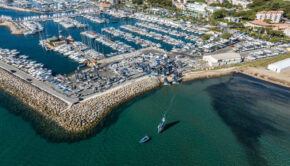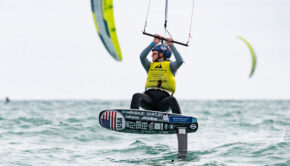Administration of Olympic Sailing needs a Reboot
Published on August 12th, 2014
American Morgan Reeser, a two-time 470 class Olympian and an Olympic silver medalist, has been equally successful as an Olympic coach for Greece and Great Britain. For the 2016 quad, he is working with Austria and USA, and provided in Part 1 his observations of the sailing venue following the Olympic test event in Rio on August 3-9. In Part 2, Morgan shares his concerns about Olympic sailing administration…
There is no doubt in my mind that Rio 2016 can be the best sailing Olympic Games ever, with challenging conditions on a number of very different course areas all surrounded by stunning scenery. However, the one thing that can detract from the great performances that we will see at Rio 2016 is the ever growing “over administration” of the Games.
“The Olympics is such a great event; it is just a pity that the athletes keep getting in the way.” – Olympic official Atlanta 1996.
If Olympic organizers took a step back to reminisce and remind themselves why they originally got involved in the Olympic Games, I would hope it would be to support and witness great athletic performances. Unfortunately, by all appearances, this has been forgotten for the sailing events.
The administrators, from ISAF to the Rio 2016 organizers to the race managers, have taken complete ownership of the sailing competition. The athletes, who are the true owners in this sport, have been taken out of the loop.
The focus needs to return to the athletes, as they are the reason we are all involved. To insure great performances, the athletes must be respected, listened to, and given proper communication of what will happen next. Instead, the athletes are generally treated like mushrooms – kept in the dark and fed dung. Current decisions are poorly thought out, made last minute, and inconsistently communicated.
I had the opportunity in February 2012 to attend the Track Cycling World Cup in London, and tour the facility with the competition manager. The Brits are significantly better than the rest of the world at track cycling, and the tour shared specific details into how the venue was designed and built to effect great performances.
The venue doors are vacuum sealed so there is no air movement at all at track level, the temperature is closely controlled to allow the bikes to run their fastest, and the track is made of a rare Russian super hard wood that continues to harden as it ages, so the bikes would be that little bit faster. Most interestingly was that the finish line was moved on the track for most of the events from midway on the straightaway to the end of the straightaway so that more world records (ie great performance) could be set on that track. The Brits designed the venue not for the spectators, but specifically so that the athletes could have great performances.
Insuring the sailing venues can provide great performances must be a mandate.
The growth of regulations for each Olympics has been startling. As German Olympic sailing legend Jochen Schümann said when leaving a Team Leaders meeting in Athens 2004, “I believe that I had more freedom growing up in East Germany than we have in this Olympic Marina.”
At the 2012 Games in Weymouth, the athletes were presented with the regatta rules, most of which came about a week before competition, all in separate bound booklets.
They consisted of:
-Notice of Race
-Sailing Instructions
-Coach Boat Regulations
-Competition Area Regulations
-Timing and Tracking Instructions
-Onboard Camera Instructions
-Provisional Course Allocations
-Race Management Policies
-Jury Information to Athletes
-Medal Race Information to Athletes
-Equipment Inspection Schedule
-Equipment Inspection Policy
-Blogging and Social Media Guidelines
-Anti-Doping Rules
-Guidelines regarding Authorized Identifications
And the most important rules of all, at least to the organizers were:
-ISAF Discretionary Penalties
-ISAF Standard Race Committee Penalties
You can still peruse them at www.sailing.org/olympic_documents_london_2012_about.php
All told, if my memory serves me correctly, it was 147 pages of regulations that the London 2012 Organizers decided the athletes obviously needed in order to be controlled. I am highly confident that unless we stop the madness that is Olympic Sailing, regulations for Rio 2016 will top 200 pages of rules and penalties.
I coach at the Olympic level because of the sheer passion with which the athletes compete. Olympic sailors do it to challenge themselves, and dream of winning an Olympic Medal. The competition is pure and simple.
The Olympic sailing organizers need to remember why they first got hooked on the Olympics – to support and witness the great performances of these sailors. If all the decisions for the 2016 Rio Olympic Games are based on if they will positively improve the athletic performances, or detract from them, then management decisions will be clear and positive, and Rio 2016 can truly be the best Olympic Games sailing event ever.
I hope that is the case.









 We’ll keep your information safe.
We’ll keep your information safe.